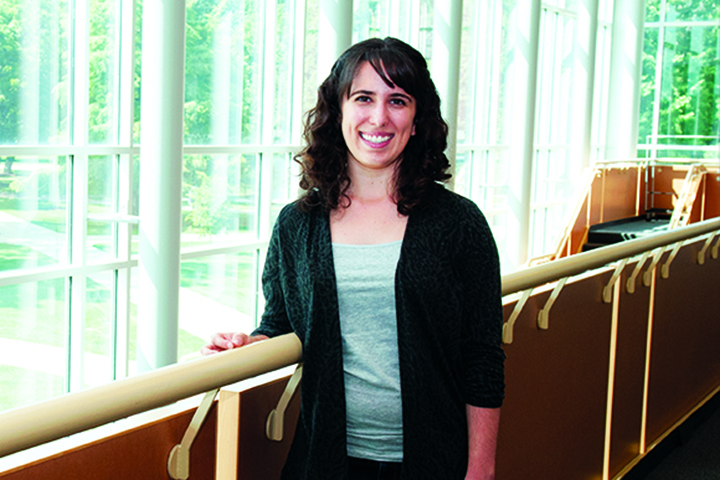A Friends of the Arts scholarship allowed Molly Briggs, a senior acting and theatre management major, to intern last summer at The Studio Theatre in Washington, D.C.
The internship benefited the Normal native personally and professionally. In the following Q-and-A, she talks about the experience and the importance of Friends of the Arts scholarships.
Why did you become involved in theater?
I have a sister, who is about seven years older than me. When she was in junior high and high school, she was involved in theater, and so I was “dragged along” as a little sibling to watch her shows. I think that’s probably where the original spark happened. I didn’t really start doing theater myself until I was a sophomore in high school, but it definitely took over my life once I did. I came to college undeclared, but I knew that I wanted to study teaching, business, or theatre, and I figured that ISU is a good school for all three. So there I was, undeclared, and all of my friends were auditioning for plays. And I thought, “I’m so jealous. I wish I was out there doing that.” And that’s when I knew this was the path for me.
Tell me a little bit about the internship?
With my acting and theatre management background, I knew right a way that I wanted to work at a professional theater in D.C. The scene out there is pretty big, so I picked The Studio Theatre because I thought it would benefit me as both an actor and as a theatre management major. The Studio Theatre has two portions: theater spaces where they produce their regular show season, and an Acting Conservatory, with both adult classes and youth classes. I worked as the education intern, helping organize and run the Conservatory over the summer.
What did you learn from the internship?
One lesson I took away was how all of the different departments within a professional theater company work together. Luckily for me, I was able to spend a little time in each area, learning how they operate. For example, I helped the literary department as a part of the proofing committee, which looks over all the outgoing documents and marketing materials before they go to the printers. As the education intern, specifically, I was also able to interact with the Conservatory teachers and see what skills they think are important for up-in-coming actors. Once, I was asked to attend a professional lottery audition as a casting assistant. Those auditions last literally all day, so I had the chance to see over a 100 D.C. actors strutting their stuff. It was very informative: I definitely used strengths and weaknesses that I saw in the auditioning room that day to influence my own auditions this fall.
Why do you think these Friends of the Arts scholarships important?
I know there is no way I could have gone to D.C. without the help of the scholarship. I think these scholarships are important because they give students a chance to do something they wouldn’t be able to do on their own: I’ve never lived anywhere other than Normal; I’ve never been in D.C. as a tourist, let alone as a resident; I’ve never worked at a professional theater. So in addition to giving me a big professional advantage because I learned so much, this scholarship allowed me to do amazing sightseeing and see what it is like to live in a huge city with other students.
Tell me about what some projects you are working on now. You are with FreeStage?
Yes, I’m co-president of FreeStage. FreeStage is an RSO (registered student organization) in the School of Theatre and Dance. We are basically the student-run producing organization for anyone that wants to put on an independent show or event in the school. Students come to us with proposals for plays they want to direct or shows they want to create. We evaluate the proposals, pick the ones that we think have the most potential, and see about making them a reality. That can involve helping cast the shows, organizing rehearsals, reserving the spaces, and designing the marketing materials, for example. It was helpful experiencing all of these elements on a grand scale at The Studio Theatre, because I could come back and apply them to our FreeStage model here.
What do you want to do after college?
I know I definitely want to move to a big city. For theater, that’s something I’ll have to do anyway, but living in D.C. really helped me realize that I do want to be around the hustle and bustle and the culture and everything. I suppose my plan is to move to either D.C., Chicago, or Seattle. During the day I would like to work in arts administration, managing or producing, and then in the evenings or on the weekends pursue my acting career. I hope to find a way to balance both of my passions.

